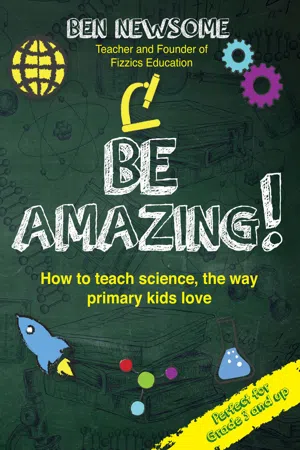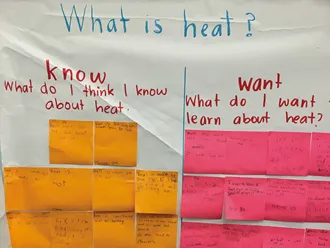![]()
1. Understanding the students
‘You are always a student, never a master. You have to keep moving forward.’
— Conrad Hall
In this chapter, we’ll look at what might be going on in the heads of the kids in your class. How can you identify and challenge the misconceptions they are subject to when it comes to scientific concepts and to scientists themselves? How do you work, at the same time, with those children who demonstrate a more advanced understanding of the concepts than you’d expect? And overall, how can you make your lessons stick in their heads?
Student misconceptions: Strange ideas abound!
‘I can find in my undergraduate classes, bright students who do not know that the stars rise and set at night, or even that the Sun is a star.’
— Carl Sagan
- Just what is going on inside your students’ heads?
- How much do they really know about a topic?
- Will it affect what they take away from your lesson?
So you’re all set up and ready to teach students, but have you considered what misconceptions they are bringing into the room with them? It’s one thing to have a science lesson ready to go, but another thing altogether to have part of your lesson plan aimed squarely at addressing the misconceptions your students have arrived with.
As many teachers and psychologists know, you understand the world through the lens of your past experiences. There is a whole bunch of literature around ‘children’s science’, whereby, in the absence of scientific guidance from adults, kids will formulate their own interpretations of how the world works. To be honest, who could blame them? If no one is there to guide them, kids are forced to create reasons for how things work themselves. In many cases, what adults might see as basic concepts can be completely missed by kids, often producing some amusing results. In fact, these misconceptions can carry on into adulthood – I can remember being highly amused hearing a very good friend of mine recount a conversation she had a few years ago with her four-year-old daughter and her fifty-five-year-old mother-in-law while looking into the sky on a sunny morning:
My friend’s daughter: ‘Look how big the moon is, Mummy!’
My friend’s mother-in-law: ‘That’s not the moon, dear.’
My friend: ‘No, it’s the moon.’
Her mother-in-law: ‘No, it can’t be, the moon only comes out at night.’
My friend’s daughter: ‘Yes, it is!’
My friend’s mother-in-law: ‘No, it isn’t, dear.’
My friend: ‘No, it’s definitely the moon, you can see the same patterns on it like always.’
Her mother-in-law: ‘Really? I never thought the moon came out during the day!’
My friend, now laughing: ‘Well, yes! What did you think it was then?’
Her mother-in-law: ‘Well … I just thought it was a planet or something …’
True story. In fact, I even checked with all the people involved when I asked if they were okay with me including this in the book! So if a 55-year-old can carry a misconception like that all these years, imagine what your students might be thinking when they enter your classroom.
While adults can get a smile from an innocent explanation that’s off the mark, it does highlight the point that students will naturally formulate their own conclusions from any science lesson. This means that pointing out ‘the obvious’ is a critical process. Here are some key points to be aware of:
- You can’t assume that the children in the room actually know what you’re talking about.
- Students might have a completely different idea of a scientific process before the lesson. Remember, it’s not that long ago that people thought the world was flat, that atoms didn’t exist and that the universe revolved around the Earth. And there are parts of the world that still cling to these notions.
- Any prior learning could have produced a series of ‘half-truths’, where the kids get only part of the previous lesson and bring this into the next. This might mean that critical information from your previous science lesson is missing, bringing in the potential for the students to get lost very quickly with the new content.
The best way to pick up on these issues is to simply keep questioning the kids’ understanding of a concept. Ask ‘why?’ as many times as possible so that students can tell you what they know. It may be worth going over old content before explaining new ideas to students, a practice tried and tested in many a classroom across the world.
A fantastic way to find out what students want to know – Good Shepard Primary School, Rooty Hill
Why not get the students to brainstorm what they think using Post-It® notes and stick them on a large sheet of paper for a classroom discussion? This way, you can identify what students know about a topic, as well as what they’d like to know. Students can then quickly contribute to the topic, and you’ll be able to tailor your teaching to the class’s needs more effectively.
With all this in mind, it might be useful for you to see some of the student misconceptions that my team and I have heard while touring to present school science shows and workshops. Some of these misconceptions are well known, others very much came from left field ... but all showed us and the attending teachers that you can never assume that the students in front of you are formulating their ideas in exactly the way you expect. In no way is this a definitive list (we would need qu...

